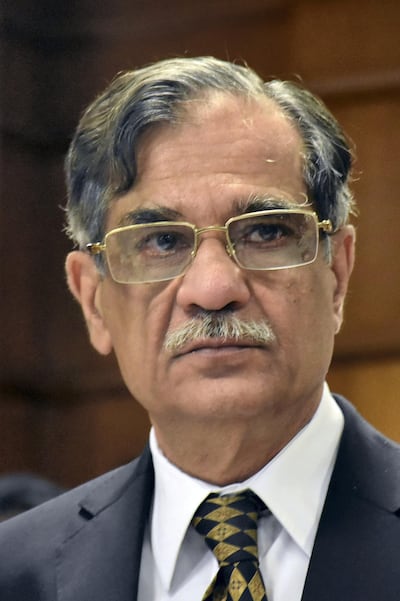As Pakistan's Chief Justice, Mian Saqib Nisar, has an in-tray which might daunt even the most hyperactive judge.
The country's creaking courts system faces a backlog of nearly 2 million cases stretching back years, while judges face death threats from anti-blasphemy campaigners and are overseeing a raft of politically sensitive cases.
Yet for the 64-year-old, Pakistan's judicial problems are seemingly not enough as Chief Justice Nisar has set himself an even bigger challenge.
Alarmed by reports of a looming water crisis in Pakistan, the top judge has become an unlikely crusader in trying to solve his country's water shortages.
Mobilising patriotic fervour and pride in large construction projects, the judge has become the standard bearer for an unprecedented scheme to crowdfund construction costs for two dams, one of which would be among the biggest in the world.
The chief justice has taken it upon himself to resurrect a stalled plan to build a vast dam on the upper reaches of the Indus and a smaller dam nearby.
He has declared that building the enormous Diamer Bhasha dam and its smaller sister project in Mohmand District are vital for Pakistan's future.
To achieve his goal, which is estimated to require some $17 billion (Dh 62.5 billion), the chief justice has roped in business leaders, celebrities, overseas Pakistanis and even Prime Minister Imran Khan as he courts donations.
Yet critics of the project warn it risks being a white elephant, driven more by nationalist zeal than science and will do little to help Pakistan's water problems.
Chief Justice Nisar's fundraising last week took him to the UK, where he held a telethon on Friday live from Manchester. Mr Khan has said he wants overseas Pakistanis to donate at least $1,000 each to the scheme.
“We started the fundraising campaign after all due consideration. We started it by taking our patriotism into consideration,” he said on Friday.
______________
Read more:
Pakistan bans Indian TV as water concerns rise
Battle of the power plants hots up in Kashmir
Famed Kashmiri lake left high and dry
______________
“Water is linked with life. If there is no water, there is no life,” he added.
As well as donations, the seizure of looted money stashed overseas by corrupt politicians, businessmen and officials will be used, he said.
The scale of the project is huge. If built, the Diamer Bhasha dam will block off a Himalayan valley and stand at 272 meters high, making it the world's sixth tallest dam.
Exhortations to donate are everywhere. Every bank carries banners, every ATM has a screen message reminding users and the news regularly covers stories of businesses, organisations, or even school children doing their bit.
But the donations are still only a trickle and amount to a small fraction of what is needed. At present, the pot stands at somewhere around $60 million. Sceptics have pointed out that at current rates, it will take more than a century to reach the total.
Chief Justice Nisar has been unswerving in his determination though. He has denounced the dams' opponents as traitors and enemies of the state.
His high profile has led to speculation he will enter politics when he is due to retire early next year, though he has denied it.
His critics say he should focus on the courts and leave dams to the experts.
“Why doesn't he just stick to looking after the courts? He is hyperactive,” said one senior Pakistani business figure who declined to be named for fear of drawing the judge's ire.
There are also questions over whether such a mega-dam project is what Pakistan needs.
An Oxford University study in 2014 warned that success stories like the US Hoover Dam, which came in under budget, early and was credited with helping jump-start America out of depression, are unusual.
The survey of 254 dam projects found that on average they come in nearly twice over budget. They often leave developing countries burdened by huge debts and many work out economically unviable, the study claimed.
Smaller projects or better water management would be more efficient and more cost-effective, critics of the dams have suggested.
Dr Daanish Mustafa from King's College department of geography says most of Pakistan's water resource managers come from civil engineering backgrounds and are unable to see beyond building dams.
“There is this fallacy continuing from the mid-20th century that dams are equal to development,” he said. “If you are going to develop then you need to have dams. In Pakistan, to my mind, it is almost a religious issue. It is almost impossible to have a rational conversation about it.”
The twin dams may end up costing around 10 per cent of Pakistan's annual GDP he said.
Chief Justice Nisar is unflagging in his optimism, however.
“Inshallah we will build many dams on the Indus river,” he said.
The judge who is due to retire in January is also reported to be turning his energies to another of Pakistan's problems – overpopulation.
He told Pakistan’s Geo News he would formally kick-start a population control programme from next month but gave few specifics.
“I will start the advocacy from my home,” was all the detail he would give.


